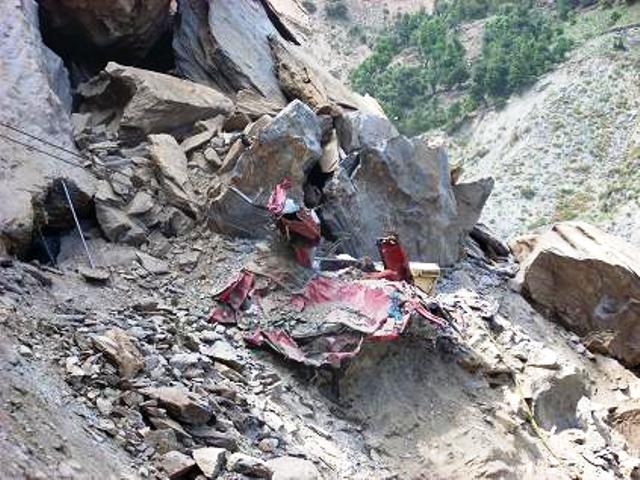1 May 2008
Serious landslide in Indian Kashmir – at least 20 people killed
Posted by Dave Petley
Updated: It appears that May has started with a terrible rockfall in Indian Kashmir (Figure 1). Reports are still rather sketchy, but it seems that the landslide occurred in the Chatroo area Kadiyah,which is about 220 kilometers from Jammu. The rockfall which happened on a road linking Kishtwar and Islamabad, seems to have been caused by blasting. Greater Kashmir online reports:
Eyewitnesses said that the incident took place when some of the labourers were busy in blasting a hanging part of the mountain for widening of the highway this morning. Two tippers, carrying labourers working with the Border Roads Organisation, crossed the same spot from opposite sides when a large portion of the mountain slid down, burying the two tippers and men under several feet of earth.
 Figure 1: Greater Kashmir online image of the 1st May landslide, showing one of the buried vehicles. The chances of survival appear to be very limited.
Figure 1: Greater Kashmir online image of the 1st May landslide, showing one of the buried vehicles. The chances of survival appear to be very limited.Reports vary on the number of victims, but at least 20 and maybe as many as 30 seems to be the ballpark figure. The outlook doesn’t look promising for the victims judging by Figure 1. Understandably, recovery is proving difficult – Greater Kashmir online reported:
“We need to blast the large stones that cannot be moved otherwise,” Kishtwar’s additional deputy commissioner, Riyaz Ahmad Zargar, told Greater Kashmir. “It is difficult to tell how many more are trapped. Fears are that the number could be in excess of 20. Exact details of the causalities can be ascertained only when the rescue operation ends.” Zargar said that screams could be heard from under the rocks and efforts were being made to rescue men who could still be alive under the debris.
In an earlier post I highlighted the danger of mountain roads to buses. In a sense these trucks were being used for the same purposes, once again with tragic consequences. Sadly of course with good supervision during construction such rockfalls can be mostly avoided.


 Dave Petley is the Vice-Chancellor of the University of Hull in the United Kingdom. His blog provides commentary and analysis of landslide events occurring worldwide, including the landslides themselves, latest research, and conferences and meetings.
Dave Petley is the Vice-Chancellor of the University of Hull in the United Kingdom. His blog provides commentary and analysis of landslide events occurring worldwide, including the landslides themselves, latest research, and conferences and meetings.